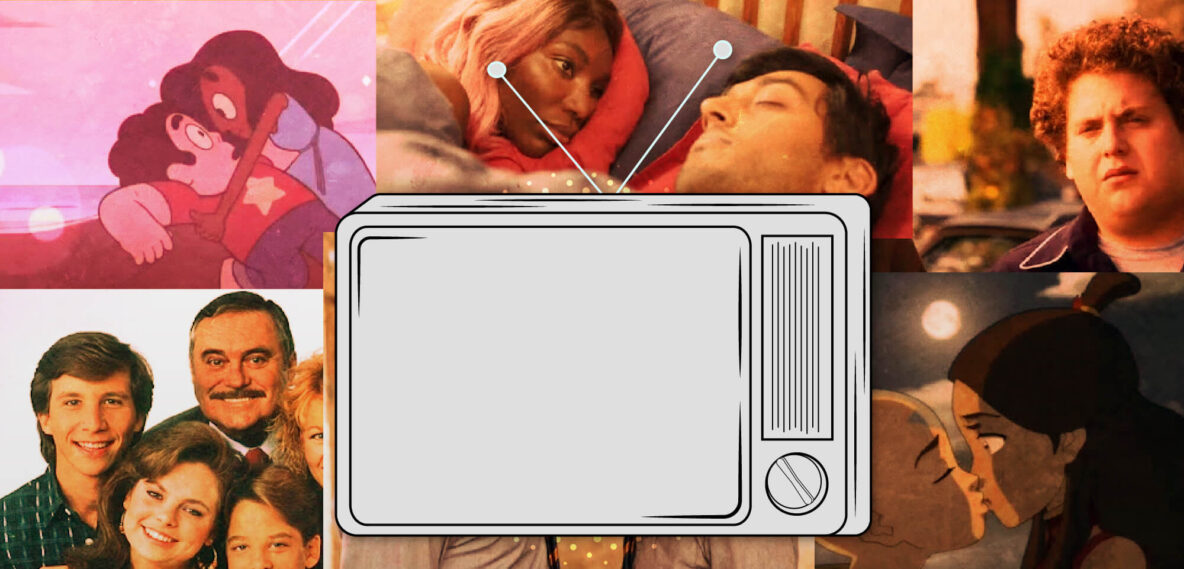[7:00 minutes to read]
You might find that your teen is more open and engaged talking about media than they are listening to a parental lecture.
You’re not alone if you feel like the conversation about consent is growing more complex by the year. Terms like “enthusiastic consent” and “nonverbal consent” are relatively recent additions to the discourse. As parents, we want to give our children the best possible tools to protect themselves and have healthy relationships. That means talking to them about consent and brushing up on our own understanding of the subject.
If you aren’t sure where to begin, it’s helpful to have reference points from an area your teen probably enjoys discussing: film and television. You might find that your teen is more open and engaged talking about media than they are listening to a parental lecture. Many teenagers want to share their burgeoning opinions on social issues - just in a way that feels meaningful to them.
Here are seven film and television scenes that spark important conversations about consent. They’re not all sexually explicit; some of them are appropriate for children and preteens. We’ve started with scenes you can watch with your whole family and worked up to the raunchier stuff. Chances are your teen is familiar with at least a couple of these examples. But even if they aren’t, consider these media moments your refresher course in the intricacies of consent.
#1: Steven Universe
Episode to Watch: Season 1, Episode 37
Age Recommendation: Ages 10+
Where to Watch It: Cartoon Network, Hulu, or HBO Max

“Steven Universe” is Cartoon Network’s first animated series created by a woman. The show follows a young boy named Steven and alien humanoid “Gems” who help protect the world with their magical powers.
Although the show never mentions sex, it manages to teach valuable lessons about consent, healthy relationships, and bodily autonomy. One of the Gems’ superpowers is the ability to fuse with another Gem to become an even more powerful being. How do they do this? By performing a special dance which both parties agree to partake in.
Steven, who is half-Gem, fuses with his best friend Connie in episode 37 of the series. He offers Connie his hand and they begin to dance. After the fusion, the newly formed “Stevonnie” rushes to tell Garnet, the leader of the Crystal Gems and the product of a fusion herself. Garnet tells Steven and Connie that it’s all up to them to make sure their fusion is a good experience - sage advice for any relationship or act of physical intimacy.
As Steven and Connie adjust to being Stevonnie, they periodically check in with each other to make sure they’re both comfortable with the actions they’re taking as a fused entity.
#2: Avatar the Last Airbender
Episode to Watch: Season 3, Episode 10 & Season 3, Episode 17
Age Recommendation: Ages 8+
Where to Watch It: Netflix, Amazon Prime, or Paramount Plus
![]()
“Avatar the Last Airbender” provides another great example of the fact that consent isn’t just about sex. In season 3 episode 10, the show’s protagonist Aang is preparing for an important and potentially life-threatening battle. Worried that he may never see his friend Katara (for whom he has strong feelings) again, he kisses her goodbye without warning.
Several episodes later (episode 17), Aang and Katara discuss their relationship. Katara tells Aang that she doesn’t think it’s the right time for them to be more than friends. Just as she’s telling him she’s confused, Aang kisses her, again with no warning. Katara grows upset, telling Aang, “I just said I was confused!” and storming off.
From Aang’s perspective, he thinks if he just kisses Katara again, she’ll see there is a spark between them. From Katara’s perspective, Aang isn’t listening to her or respecting her wishes. Aang thinks he knows what Katara wants and takes an action that involves her body without her willing participation. The scene serves as a reminder that we should never assume we know what someone wants to do with their body, whether it’s a kiss or a more sexual interaction. It’s a refreshing moment in a world where surprise kisses are a romantic comedy trope.
Even if you think your teen is way too young to be having sex, it’s not too early to discuss consent with them. Using a PG example like this one is a great way to start.
#3: Mr. Belvedere
Episode to Watch: Season 4, Episode 20
Age Recommendation: Ages 10+
Where to Watch It: YouTube
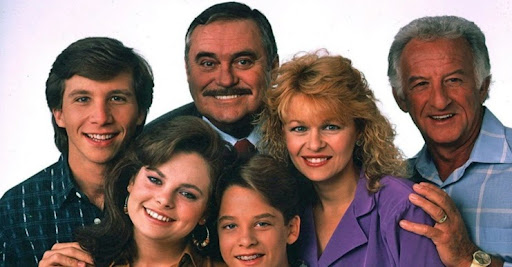
When we talk about consent, the focus is often on teaching boys that they must ask their partners for it. This is obviously an important piece of the conversation, but what about when it’s a boy who has his boundaries violated?
Some parents might remember the 1980s family sitcom “Mr. Belvedere.” While chances are slim that your teen has ever heard of the show, there’s a great episode where a young man speaks up about something that makes him uncomfortable and his parents handle the situation perfectly.
In season 4 episode 20, young Wesley goes to summer camp and has an interaction with an adult counselor that he senses is inappropriate. While they are alone in a cabin, the counselor begins to massage Wesley’s bare shoulders. Wesley knows something is wrong and makes an excuse to leave the cabin right away. He tells his parents about the incident and they report the counselor.
It’s a great example of a young man trusting his instincts that someone has crossed a boundary and speaking up about it, despite feeling embarrassed. When it comes to teaching young men about consent, it’s essential to include conversations about their right to say no and walk away if they feel uncomfortable.
Although Mr. Belvedere isn’t currently available on any streaming platforms, you can find the episode on YouTube by searching “Mr. Belvedere season 4 episode 20.”
#4: Sex Education
Episode to Watch: Season 2, Episode 3
Age Recommendation: Ages 16+
Where to Watch It: Netflix

This Netflix original covers almost any sexual problem you can think of over the course of its three seasons and although it’s lighthearted and funny, it’s also unafraid to tackle serious topics.
In season 2 episode 3, teenage Aimee is riding the bus when a man masturbates and ejaculates on her. No one on the bus speaks up or helps her. Aimee tells her friend Maeve about it, acting like she’s more concerned about the stain on her jeans than anything else. Maeve tells Aimee she’s been assaulted and that she should report it to the police.
Aimee struggles with feeling like what happened to her isn’t serious enough to report. But after a long day of recounting the assault and pretending to be unfazed by it, she begins to cry the moment she’s alone.
We’ve made great strides away from victim-blaming and unexamined rape culture, but many assault survivors still feel pressure to laugh off or minimize experiences like Aimee’s. To talk about consent is to talk about sexual assault and we must impart to our teens that we will never downplay or disbelieve their experiences. This also applies to other forms of sexual harassment like catcalling or sending unsolicited nude photos.
#5: Normal People
Episode to Watch: Season 1, Episode 2
Age Recommendation: Ages 17+
Where to Watch It: Hulu
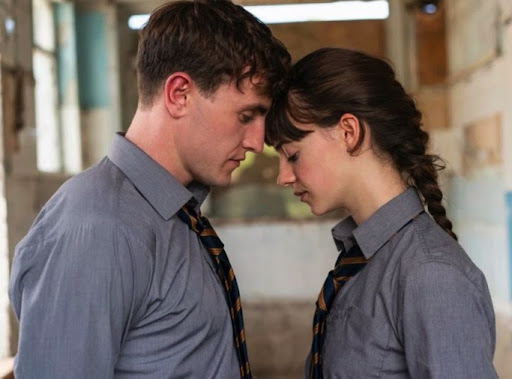
If you’re looking for a show that depicts sex with unflinching realism, look no further than “Normal People,” based on the novel of the same name by Sally Rooney. The entire series is worth watching for how honestly it deals with sex, relationships, and a young man struggling with anxiety and depression, but episode two is a masterclass in consent.
When Marianne loses her virginity to the more-experienced Connell, she is very eager to get started. But Connell takes a moment to tell Marianne that they can stop at any time if she’s uncomfortable or in pain or for any other reason. He assures her that “it won’t be awkward” if she wants to stop. It’s an important reminder that consent isn’t just something that happens once before anyone takes their clothes off - it can be rescinded or redefined at any point during a sexual encounter for any reason.
As we teach our teenagers that their sexual partners must provide consent, we must also empower them to speak up for themselves and their bodies in every situation.
#6: Superbad
Age Recommendation: Ages 16+
Where to Watch It: Rent it on Amazon Prime, YouTube, Apple TV, or Google Play
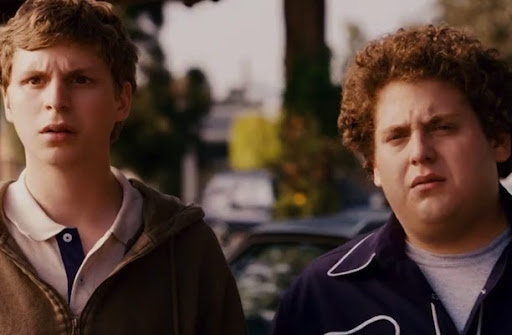
It’s an ongoing debate in the consent conversation: is drunken sex ever okay? Can drunk people give consent? If both people are drunk, is it okay?
Fourteen years after its release, “Superbad” is still the best piece of media for teens where characters make healthy choices regarding drunken sex. A good rule of thumb when it comes to drunk sex, especially with a new partner? Don’t have it.
In “Superbad,” best friends and high school seniors Seth (Jonah Hill) and Evan (Michael Cera) are on a mission to have sex with the girls of their dreams at an epic house party. When Evan’s very intoxicated crush Becca starts putting the moves on him, he turns her down. He knows that Becca is too drunk to consent even though she is seemingly persistent. When Becca is sober, she is grateful to Evan for handling the situation as he did.
The reverse then happens with Seth and his crush, Jules. Seth has been drinking heavily but Jules is sober and tells Seth she doesn’t want to hook up while he’s drunk. It’s a great reminder that it goes both ways: girls also have a responsibility to make sure their partner is in a proper state to give consent.
#7: I May Destroy You
Episode to Watch: Season 1, Episode 4
Age Recommendation: Ages 17+
Where to Watch It: HBO Max
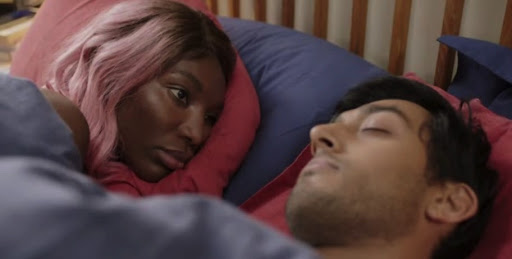
“I May Destroy You” brilliantly handles a young woman’s experience after she is sexually assaulted. The entire series is a must-watch, but one episode, in particular, shines a light on a type of sexual assault that still isn’t widely talked about.
In episode 4, the protagonist Arabella has sex with a fellow writer named Zain. During sex, Zain removes the condom without Arabella’s knowledge, an action known as “stealthing.” Arabella reports the incident and learns that it is considered rape in the eyes of the law.
The episode exposes a blind spot in many people’s understanding of what constitutes sexual violence. As parents, we must continue to educate ourselves so we can empower our children to make safe, ethical sexual decisions. “I May Destroy You” also gets bonus points for its thoughtful portrayal of a gay man’s experience with sexual assault and the societal double standard for male victims of sexual violence.
Final Thoughts
Watching any of these episodes (and one film!) is a great way for parents to familiarize themselves with the current discourse around consent. If your teenager has watched or heard of any of these examples, you have an opening to start a discussion. Once the line of communication has been open, your teen will feel more comfortable coming to you with questions or concerns about consent.
If you’re still not sure how to broach the topic, check out the video below. It’s an entertainingly straightforward explanation of consent that any teenager will appreciate (includes some profane language).
Share this Post

